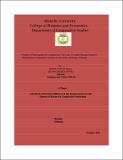| dc.description.abstract | Women’s participation can be viewed as the active involvement of women in all spheres of affairs. Rural women could play a significant role in agricultural production. Despite women’s contribution to their livelihoods, food production and national economies is immense, it has not been translated into better access to resources or decision making powers. Their participation in management board, decision making and other cooperative affairs is generally low. Therefore, identifying firstly their level of participation in cooperatives, secondly the factors that affect their participation in cooperatives and thirdly the benefit they could get from the cooperatives were characterized as the specific objectives of Gedeb Hassasa Farmers Multipurpose cooperative society.
A multistage sampling method was adopted to select 101 women respondents from five cooperative societies. FGDs conducted with cooperative members of both sexes.
From the study result, women’s participation in the general assembly and in the decision making process at all levels is very low, whereas, the participation of women in other traditional social institutions was high.
The findings of the descriptive results shows that work load in the household rank first in order of rank: however, the FGDs reveals participation in the informal institutions is the major problem affecting women’s participation in cooperatives.
The finding of the descriptive results shows that the majority of women respondents did not know the by-laws, rights, duties and obligations, and cooperative values and principles. With respect to access to training only 24.5 % of women respondents were trained.
The descriptive result also reveals the economic and social benefit of cooperatives to women. From the results one can observe that there has been a somewhat improvement in qualities of life such as in improved access to food, schools, health care, housing and clothing. In a similar ways the findings of the study also shows that the source of credit after joining the cooperative society has been increasing compare to that before participating in cooperative. | en_GB |


